Summary 
Excellent outdoor production elevated by a superb lead performance and a slew of strong supporting roles, especially a lusty villain Claudius and a heart-broken Ophelia. Much emphasis on the Ghost - haunting Hamlet as his father, the Player King, and one of the grave diggers - but the main strength is the portrayal of the title prince as a sympathetic but conflicted young man painfully aware of his impending doom.
Design
Directed by John Langs. Costume design by Alejo Vietti. Scenic design by Takeshi Kata and Andrew Boyce. Lighting design by Michael A. Peterson. Sound design and original music by Daniel Kluger.
Cast
Ro Boddie (Horatio), James Pickering (Ghost/Player King/Grave Digger), Jim DeVita (Claudius), Deborah Staples (Gertrude), Matt Schwader (Hamlet), David Daniel (Polonius), Eric Parks (Laertes), Cristina Panfilio (Ophelia), Ryan Imhoff (Rosencrantz), Steve Haggard (Guildenstern).
Analysis
John Langs imbues this outdoor production of Hamlet with a fear of the Ghost of the dead king. Even before the American Players Theatre (APT) production begins - as the audience enters at nightfall and takes its seats - the castle Watch nervously prowl the stage and the aisles - "I am sick at heart" - looking frightened as they peer around and whisper. The soldiers wear skull caps and capes in the Danish cold, dressed in brown leather and boots, some of them shivering or blowing warm air into a fist. At an apparent noise, they jerk in alarm, all turning in the same direction to defend themselves with spears and swords. Horatio arrives 1.2, his words ironic - "have you had...quiet...guard?" - revealing Langs' and his actors' expert attention to the smallest of details. Within a discordant musical note, the Ghost appears - gray-haired and bearded, ghastly pale and dark-eyed - exiting in offense when swords are drawn. Langs makes good use of the disturbing and disturbed spirit, the same performer in the same ghostly appearance also portraying the Player King as well as a Grave Digger. Lang adds a chilling non-textual appearance at the conclusion, the Ghost looking down upon the bloodbath of the duel.
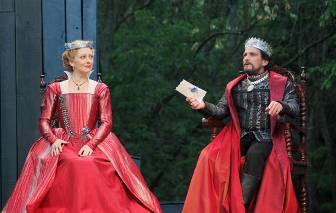
Jim DeVita plays Claudius, a freshly crowned King clearly in love with, and lusting for, his new wife - "our sometime sister, now our queen" - arriving to the court's enthusiastic applause in 1.2. DeVita's goateed Claudius is robust, confident to the point of cockiness, lingering over kisses with Gertrude. He commands his court, dismissing Fortinbras - "so much for him" - then promoting Polonius and entreating Laertes to remain. Laertes is not permitted to address the King without a written script by the controlling Polonius, and Ophelia stands still, her eyes down in obedience. Throughout, Matt Schwader's Hamlet stands apart, in a spot light deep within the audience, up a staired aisle. He wears mourning black, and his manner is despondent, but he is handsome and athletic, stalking to the stage and to Claudius' court when entreatied. He turns his back to them - "but I have that within which passes show" - and Claudius and Gertrude sneak a lusty kiss. Schwader's Hamlet spins when insulted by his uncle - "'tis unmanly grief" - but acquiesces to his mother: "I shall in all my best obey you, madam."
Schwader's Hamlet is a "sweet and commendable" young man, eager and almost desperate for the audience to understand his anger - "frailty, thy name is woman" - as well as grief: "break, my heart." He is dashing and well-spoken, commanding both respect and admiration, as evidenced by the way he is addressed by not just Horatio but by Marcellus and the Watch. Schwader's Hamlet shows a hero's courage, as he stops the Ghost's exit 1.4 - "father!" - then breaks free from Horatio: "my fate cries out!" During 1.5, he shows loyalty as he kneels at "mark me!" then embraces his father ("adieu!"), and once alone on the rampart, he opens the royal urn and smears the ashes across his face: "the time is out of joint." After the head-scratching decision to feign madness, Hamlet toys 2.2 with Polonius - "you are a fishmonger" - although he becomes deadly serious ("except my life") with the old man, and after Rosencrantz and Guildenstern arrive - interrupting yet another kiss of Gertrude by Claudius - Schwader's Hamlet begins to reveal his secrets - "Denmark's a prison" - before realizing that his friends are actually spies: "I know a hawk from a handsaw."

Stalwart APT character-actor David Daniel presents a complex Polonius who is not just a doddering old single parent but a political pragmatist and a pedantic tyrant. In 1.3, when Laertes attempts to warn Ophelia about Hamlet - prophetically, "his will is not his own" - she giggles and covers her ears, then both mimic their father and share a laugh at his expense. When Daniel's Polonius enters with his briefcase, he sternly instructs both children, shouting at her to "look to 't!" Later, after drifting off in mid-sentence 2.1 and meandering 2.2 ("brevity is the soul of wit"), he misfires on Hamlet's diseased wit: "this is the very ecstasy of love." He also sends a spy after Laertes, cuts off Ophelia in mid-protest by intimidating her with a mere clearing of his throat, and at the mousetrap scene shields Claudius from Hamlet with his body.
Schwader's beleaguered Hamlet - betrayed, wounded, angry - shows raw fear with the arrival of the players. The Player King is obviously the ghost of his father, glaring at Hamlet as the actors take the stage, and when the performer acts out the story of Priam failing to exact revenge, he shouts directly at Hamlet in accusation: "did nothing!" Schwader's Hamlet rises to his feet at the words, and as the players exit, his "am I a coward" soliloquy comes from a fractured spirit, fearful but murderous enough to draw his knife ("bloody, bawdy villain") then stammering in confusion as he fails to focus his thoughts. Schwader impresses with Hamlet's swing of 3.1 emotions, seated elevated stage right for the "to be or not to be" soliloquy, not realizing that Ophelia is listening from a hiding place in the darkness downstage left. When she approaches him, she is buffeted by Schwader's Hamlet, from his cold detachment ("I lov'd you not") to his sudden dismissive pique ("get thee to a nunn'ry") and after her deliberate lie - the eavesdropping Polonius is "at home, my lord," she says - he takes her by the shoulders then struggles to check his cruelty: "all but one shall live." After he gives her a passionate farewell kiss, Ophelia tries to retrieve his love letter, but he pushes her away, and when she exits in tears, Schwader's Hamlet slumps broken-heartedly off stage in the other direction.
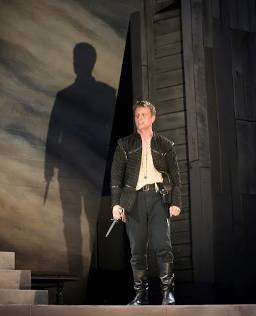
Claudius and Gertrude - "my uncle father and my aunt mother" - act like newlyweds, she gently correcting his misidentification of Rosencrantz with Guildenstern 2.2, then horrified by Hamlet's "two hour" remark regarding grief before the mousetrap play. Schwader's Hamlet exhorts the audience to applause for the scarlet-lit dumb show, and when DeVita's shrewd Claudius recognizes himself as the portrayed assassin, Hamlet strikes a cymbal, but Claudius slowly stands, and with reptilian calm says, "give me some light," then seethes "away!" as he exits. DeVita's Claudius reveals some 3.3 cracks within his confidence: following his droll admission of "I like him not" he sobs "my offense is rank" once alone with his thoughts. Langs uses footlights to light the scene, and when Schwader's Hamlet appears far upstage with dagger in hand - hesitating at killing the in-prayer Claudius: "that would be scann'd" - his profile and the dramatically upraised knife are caught in gigantic shadow play against the upstage wooden wall of the Up-the-Hill Theatre.
Schwader's Hamlet shifts from the anger he expresses to Rosencrantz and Guildenstern - he shouts, "you would pluck out the heart of my mystery," and hurls the recorder at them - to anger with his mother. After Gertrude slaps him and he mistakenly kills the concealed Polonius, Schwader's Hamlet becomes sheepish at the presence of the Ghost of his father, placing Gertrude's hand within the Ghost's ("I must be cruel to be kind"). His words to her reflect his own divided heart for revenge murder - "throw away the worser part of it" - and although she embraces Hamlet, she exits with Claudius 4.1, and her allegiance and complicity remain in question.
The killing of Polonius is a turning point for the play, and in Langs' whip-smart production, it is indeed pivotal for Schwader's Hamlet, who as a murderer no longer needs to hesitate. He seems more confident with Rosencrantz and Guildenstern, walking with them 4.2 then dashing in another direction, and in 4.3, when he defies Claudius. He stands suddenly, so Claudius' guards become alarmed and move to draw, but Schwader's prince tells the King "goodbye, mother" and kisses him on the mouth. In a howling wind during the subsequent scene, he witnesses the pointless violence to be wrought by another son of a murdered King, as Fortinbras and his troops march for a meaningless attack on Poland.
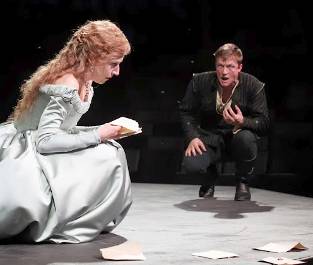
Cristina Panfilio portrays Ophelia as double-devastated with the loss of Hamlet's love and the death of her father, and she enters 4.5 singing softly, in tears, wearing a soiled dress. She hints at some retribution - "my brother shall know of it" - then spits in Claudius' face as if she is somehow aware of his guilt, and Gertrude must turn away as if she cannot bear to look at her. When Laertes arrives in a sputtering of oaths - "to hell, allegiance!" - DeVita's Claudius handles him like a therapist, soothing and explaining. When Ophelia returns, Laertes is aghast, and she places a hand tenderly on his cheek - "remember?" - drops the wooden box of flowers rudely at Claudius' feet - "there's rue for you" - and wails that her father will never come again. Finally, after a brief, moving song sung with her brother, Panfilio's Ophelia walks slowly off with some gathering dignity, and she can be seen off stage by the audience, moving like a ghost beyond the theatre to disappear along a flower and bush-lined path, silhouetted by the woods behind her. The tableaux is moving, one of a series of memorable images staged by Langs.
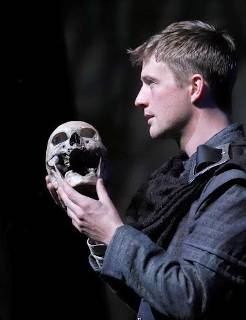
Langs concludes Shakespeare's fourth act with Laertes vowing to do what Hamlet could not - "cut his throat i' th' church" - and Schwader's Hamlet returns with more quiet confidence 5.1. He acknowledges his father's Ghost as one of the grave diggers with little surprise or fear, but with the acceptance of one who, like Claudius, has gone too far in violence. Schwader's Hamlet seems more intrigued than moved by Yorick's skull - "I knew him, Horatio" - and he stands aside to witness the procession for Ophelia's funeral that begins from the back of the audience. After "the death was doubtful" and Gertrude's "sweets to the sweet," Laertes clambers down into the grave beside Ophelia, and Schwader steps forward: "this is I, Hamlet the Dane!" He wrestles with Laertes, promising vengeance - "dog will have his day" - and holds his sides in horror at the sight of Ophelia.
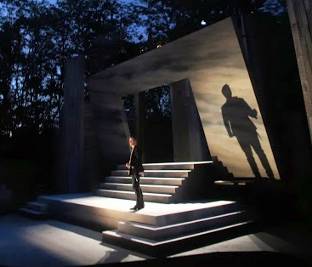
The concluding duel takes place with the house lights up, two thrones atop the steps perched over the match area. An ominous sound effect thrums throughout, silenced only for dialogue. When Gertrude offers a toast to her son from the poisoned goblet - Claudius: "Gertrude, do not drink" - she seems completely unaware of any murderous intention and therefore innocent of any complicity in the killing of the King. When Gertrude collapses - "the drink, I am poisoned" - Schwader's Hamlet becomes frantic - "treachery! seek it out!" - but DeVita's Claudius collapses with defeat and stares at his lost Queen. Only when Schwader's Hamlet thunders toward him does he resist - "defend me, friends!" - but no one comes to the King's aid, and Schwader's prince dispatches him with a twisting knife thrust: "follow my mother!'
Langs finishes with a flourish in an emotional moment - "you that look pale" - from Schwader. His Hamlet swoons, staggering backward in a free fall, only to be caught safely by his (only) friend Horatio. The collapse bears the weight of an Aristotelian purging of the soul that is a testament to the actor's performance. While Fortinbras enters from the back of the theatre, Schwader delivers the final words - "the rest is silence" - as the Ghost of his father emerges at the top of steps to look down - with some satisfaction - upon the dead.